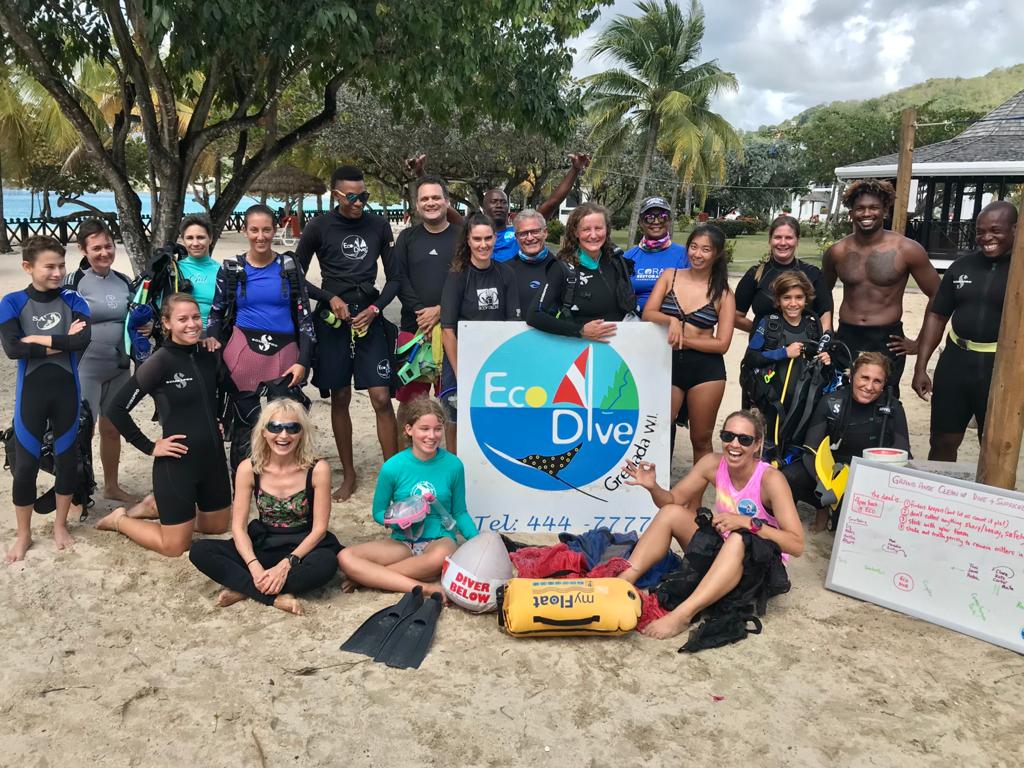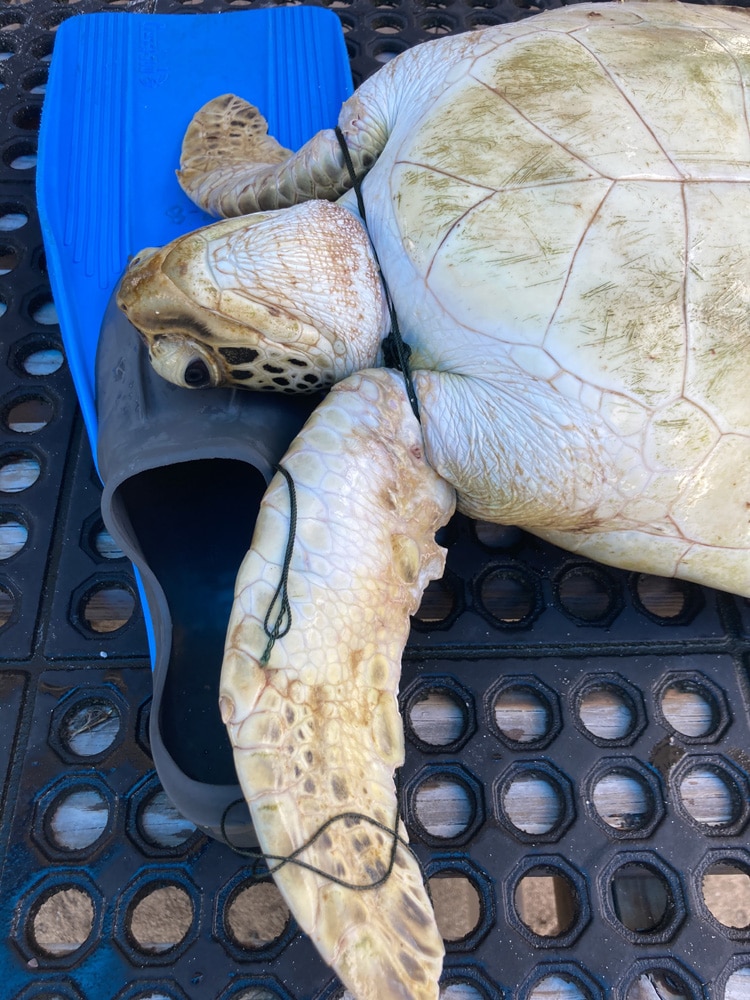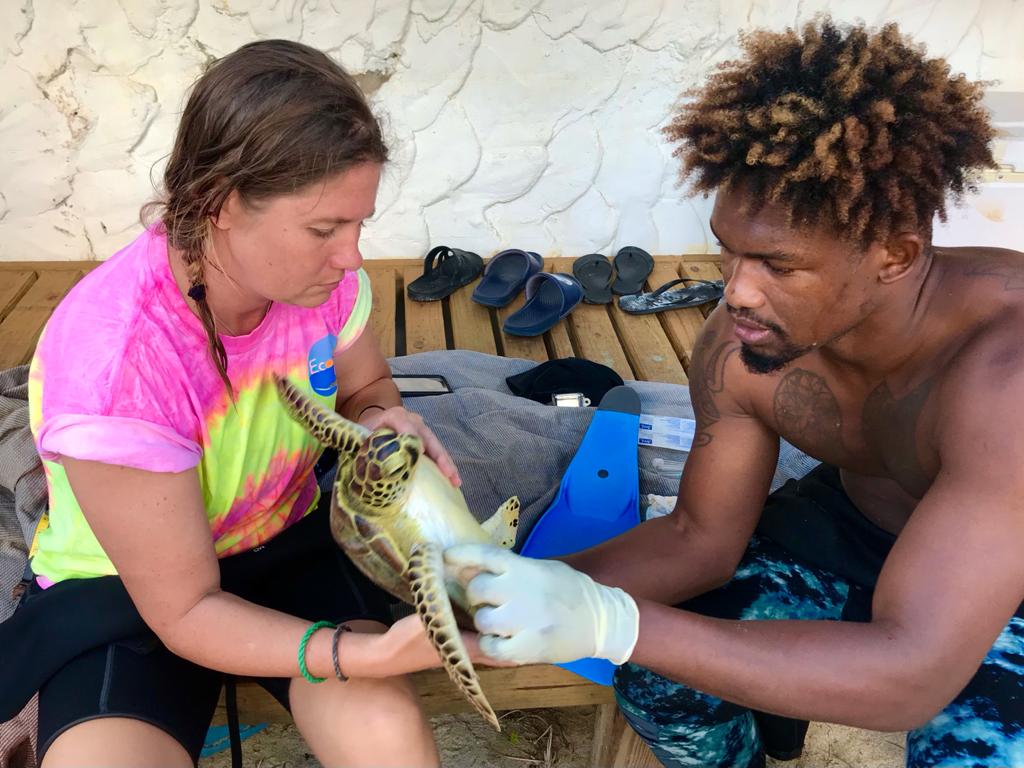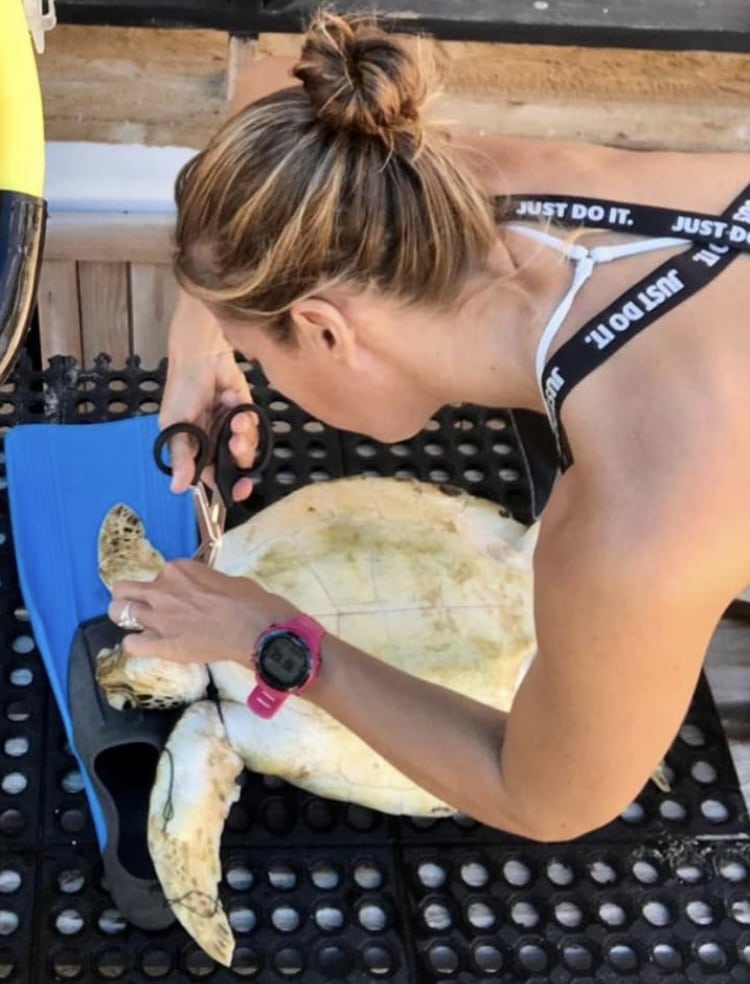Marine Life & Conservation Blogs
Sea Turtles rescued in Grenada during clean up
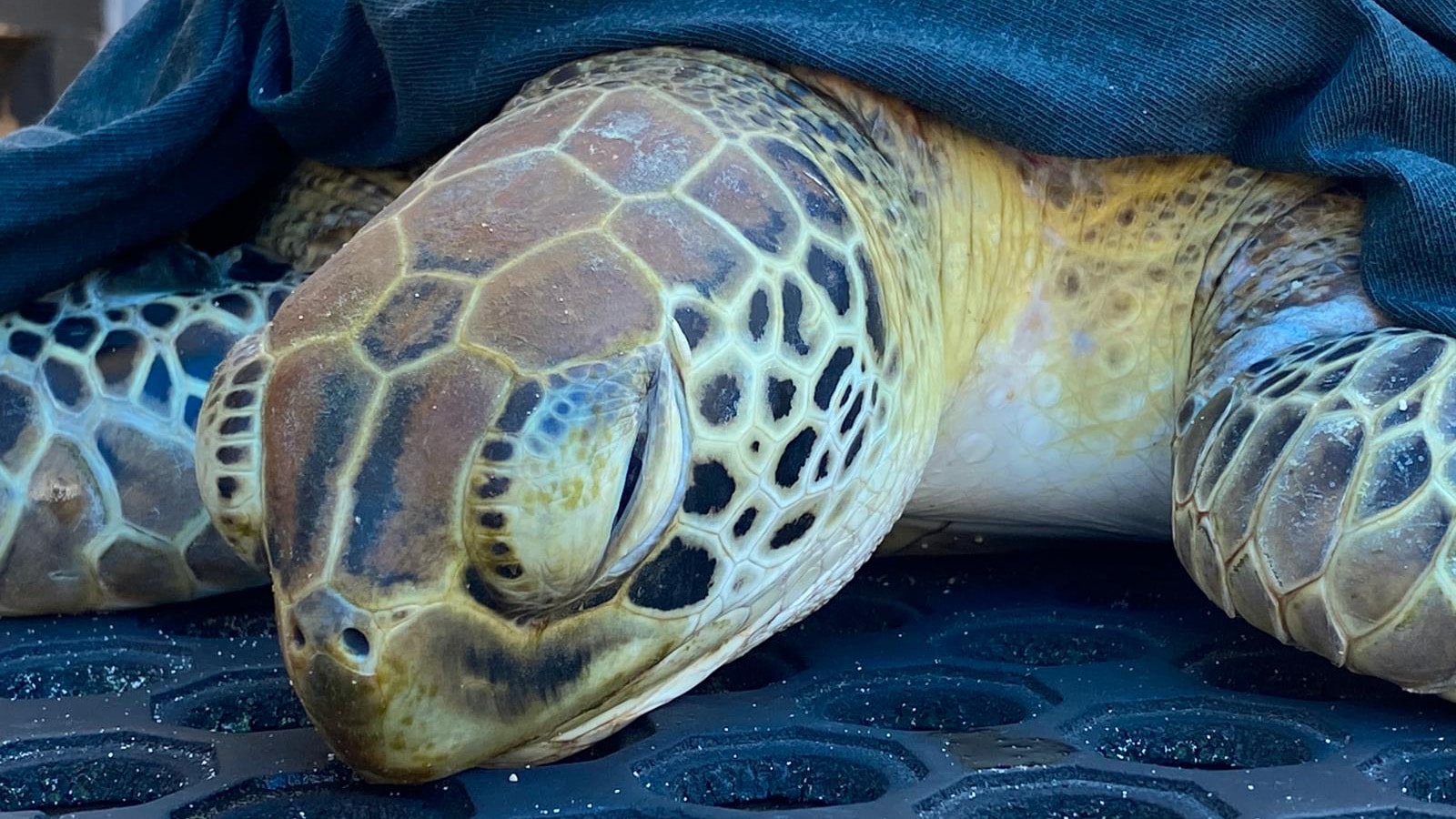
On Feb 20th twenty volunteers gathered for one of Eco Dive’s regular monthly clean up dives off Grand Anse Beach in Grenada, a shore dive site adopted by Eco Dive under the Project AWARE Adopt a Dive Site programme. With a mix of snorkelers, freedivers and scuba divers, including junior divers, the squad set out to find and recover as much ‘treasure’ as possible from the patch reef, sand patches and extensive seagrass beds skirting the beautiful 2 mile beach.
With a plan in place to cover as much of the beach as possible and focus on the high risk areas (storm drains, public jetty, public park accesses) the group set off. Divers were dropped by the dive boat up the beach in teams, a meeting time was set, mesh bags were issued and the they were off. Two more teams one of divers and a snorkel/freediving team headed off from the dive shop to cover the home base and down current zone of the beach.
With the clean-up underway the beach station was set up for sorting, counting and weighing of the haul. The debris gets sorted and the data recorded with Project AWARE to help track global trash trends and local hot spots and events. The first team back to the beach however was the freediving team, and they brought a VIP. Found tangled in kite line was a juvenile Green Sea Turtle. These juvenile turtles love this seagrass habitat off Grand Anse Beach and there is a rotating population of juveniles that join snorkelers regularly.
The team at Eco Dive are familiar with these endangered babies and work closely with Ocean Spirits, a local conservation organization, to tag and monitor these juveniles in the hopes of gaining more information on their movements, risks, health and a better estimate on the size of the local population. For anyone who has worked with a sea turtle project before you would know that catching a wild turtle is a stealth act of athleticism, especially juvenile Green’s who are deceptively quick when motivated. To see our snorkel team carrying a turtle (on a non-tagging day) had to mean something was amiss.
Sure enough timing on this clean up dive turned out to be serendipitous. This little turtle, later named Cora, was alive but exhausted. She had managed to tangle herself in a kite line and struggled so much that the line that immobilized her fore-flippers and dug cuts into her skin. Unable to reach the surface this little baby was struggling for her life, so she provided no resistance to rescuers as they freed her up to the surface and back to the dive shop for some TLC.
The right place right time nature of the day continued… with Ocean Spirits’ Director, Chair and veterinarian was on the clean up dive already, there were a further 5 veterinarians also on the clean up dive (it turns out vets love to help save the ocean and make great clean up dive buddies!) so little Cora was in good hands. Cora received some antibiotics to help prevent infection in her cuts, some fluids to help her relax and a safe place to stay for 4 days before her release safely back into the sea. Normally turtles would be tagged at the base of their fore-flippers to help identify repeat individuals and track growth etc however with the tissue damage and bruising Cora suffered under her fins on this occasion she was not tagged but marked with her name and well wishes on her shell and set free.
As for the trash clean-up dive the team successfully removed more than 38 kg of trash from the sea including 2 kites, 10+ kite lines, fishing line and lots of plastics and clothing. Juvenile octopus, mantis shrimp, cleaner shrimp, crabs, grunts, wrasse and gobies were found within the trash treasures and were released back to the sea by the sorting volunteers. Cora definitely stole the show and had all of the volunteers extra grateful for having made the effort to come out and join the clean up. More kite line remained in the sea however as some run for 100’s of meters. A plan was made by some particularly keen volunteers to come back during the week and target some of the known areas where kite line remained, the Eco Dive crew also committed to daily clean up dives for the week to get these lines out of the sea.
As the working week started, Eco Dive were back to their daily routine and booked a clean up dive with just 4 regulars for the next Friday morning. The divers were out for an hour and one of the dive teams found another turtle tangled. A different turtle, and a different kite line, but a very similar scenario. Kite line in the spring windy season is a known risk item that is found on the clean ups but a tangled turtle has never been found before until this week, and now they had rescued two! A call went out to Ocean Spirits saying “you’ll never believe me but ..” and the dive team got to work freeing the second turtle of the week from a fore-flipper straight jacket caused by kite line.
This juvenile green sea turtle, slightly bigger than Cora, was named Aurelia, after Eco Dive’s Junior Open Water Diver who is an adamant clean up diver and has been on a trash mission for weeks. Aurelia weighted in at just over 7 kg and was exhausted but safe.
Eco Dive’s tally for their clean up dives for the week: they removed over 50 kg of lines and plastic from the sea and rescued two baby turtles. A pretty good week all round!
For more information, or to join a clean up day, with Eco Dive Grenada visit their website by clicking here. You can also follow them on Facebook and Instagram.
Blogs
Saba’s Plan for a Coral Comeback

Saba has an exciting new initiative to restore its coral reefs. This new project, running from 2024 to 2026, will focus on reviving key species in the island’s underwater ecosystems. With a collaborative team from the Saba Conservation Foundation (SCF) and Van Hall Larenstein (VHL) University of Applied Sciences, the project aims to restore both corals as well as sea urchins.
This initiative is centered around coral restoration, specifically reviving two essential coral species—staghorn coral (Acropora cervicornis) and elkhorn coral (Acropora palmata). By mapping parent colonies and using a technique known as coral gardening, SCF will create and maintain coral nurseries. These corals will eventually be outplanted at key reef sites around Saba to not only expand the number of coral colonies, but also provide essential fish habitat. The project focusses on installing coral nurseries, training staff with the newest techniques and starting with the restoration of key reef sites.

Reef Cleaners to the Rescue
It’s not just corals getting a makeover—this project also shines a spotlight on the essential role of grazers, particularly sea urchins. VHL is leading the charge on cultivating and restocking two key sea urchin species, West Indian sea egg (Tripneustes) and long-spined sea urchin (Diadema), known for their ability to keep algae in check. By removing algae, which are important competitors of corals, they help the coral to thrive. By restoring these “reef cleaners,” Saba’s project will give corals the breathing room they need to grow, setting the stage for a healthier, more balanced marine ecosystem.
From Tiny Urchins to Big Goals
The project will be funded as part of the Dutch Government’s Nature and Environment Policy Plan (NEPP) 2020-2030 for the Caribbean Netherlands, a comprehensive initiative aimed at conserving and restoring the unique natural environments of the Dutch Caribbean islands, including Saba, St. Eustatius, and Bonaire. This project is aiming for big milestones: build and maintaining coral nurseries, the expansion of urchin cultivation facilities, and the creation of a dedicated research center. By 2026, the project hopes to ramp up coral and grazer restoration, with the ultimate goal of extending these efforts across the Dutch Caribbean. By linking local initiatives to broader regional goals, Saba’s restoration project promises to leave a lasting impact on both the environment and the community.
Find out more about the DCNA at dcnanature.org.
Blogs
Reef-World marks two decades of marine conservation: strengthening impact amid coral reef threats

Empowering ocean stakeholders to tackle future challenges and ensure the survival of coral reefs and humanity
2024 marks the 20th Anniversary of The Reef-World Foundation’s tireless efforts for global coral reef conservation. The UK charity is the international coordinator of the UN Environment Programme’s Green Fins initiative, known as the leading voice in sustainable marine tourism. Today, Reef-World released its 2023-2024 Impact Report outlining a year of substantive growth and impact in its marine conservation programmes.

Impact Report Highlights:
- Impressive improvements in environmental behaviours to protect coral reefs by the marine tourism industry as the global participation of Green Fins increases.
- Continued capacity building for government and NGO staff to effectively manage marine tourism activities in Asia, Caribbean and Red Sea regions.
- For the first time in Green Fins’ 20-year history, tourism operators have achieved ‘Best Environmental Performer’ status by demonstrating the lowest possible environmental impact in their environmental assessments. In 2024, three dive operators achieved this challenging milestone.
- Significant increases in global participation of Reef-World’s innovative digital conservation tools.
- 138 Green Fins dive operator members achieved the strict threshold for PADI Eco Center recognition.
- Developed four new educational materials and translated two into 16 languages to support the marine tourism industry in achieving sustainability targets.
- Establishing a new Reef-World Development strategy and recruiting new roles – Development and Programmes Managers.
- Reef-World’s board welcomes new Chair and Trustees strengthening organisational leadership.

Reef-World started as a one-person mission to inspire and empower communities to act in conserving and sustainably developing coral reefs and related ecosystems. Today, the team of 12 continues to meet this mission by inspiring and empowering the global marine tourism community to be exemplary sustainability leaders by using the Green Fins guidelines and tools to simultaneously use and protect the world’s precious reefs.
In April 2024, the fourth global coral reef bleaching event was confirmed. Reef-World’s work has never been more urgent as the marine environment, and the benefits they provide humanity, continue to be eroded by global threats. The reduction of local threats, like those from the marine tourism industry, is an essential step to ensuring a future where coral reefs survive and continue to support the millions of people who depend on their ecosystem benefits. Reef-World’s work buys time for coral reefs and related ecosystems to be resilient to the impacts of global threats.
“Right now our corals are facing the greatest fight of their existence as the terrifying predictions of the steps towards their complete extinction are starting to come true. But all is not lost, reefs are resilient and they have existed on this planet for millions of years. We must take action now, to buy time for reefs by reducing threats facing them and allowing them to react and adjust to the changing environment they need to survive in.” – Chloe Harvey, Executive Director
Looking Forwards:
Like coral reefs, the Reef-World team needs to be resilient in the face of the complex challenges of the conservation sector. Reef-World has invested significantly in developing a Culture of Care to ensure the well-being of its team on a daily basis, continuing to be an exemplary employer to enable its team to best achieve the mission for coral reef conservation.
With the foundations of a Culture of Care and organisational development laid, Reef-World is emerging from the end of a natural organisation life cycle, that brings the challenges of growth and scale, stronger than ever. With a new strategy in place to generate much needed resources, Reef-World is excited for the opportunities to leap forward, continue to scale our impact and lean into new innovations and untapped opportunities for marine conservation.
We continually strive to become a forward-thinking organisation that delivers on our goals and commitments to our stakeholders with fresh approaches and not being afraid of steering away from a “normal approach.” This approach is not only applied to our programmes of work but also internally and carries over to our Culture of Care for our team.” — JJ Harvey, Operations Director

The Reef-World Foundation is immensely grateful for the continued support of its grant funders: UN Environment Programme, IUCN’s Blue Natural Capital Financing Facility, Adventure Travel Conservation Fund, PADI Aware Foundation, and World Nomads Footprints Program.
Reef-World would also like to express its gratitude to international partners whose vital support has resulted in significant tangible benefits for our work and mission: PADI; Professional SCUBA Schools International (PSS); Explorer Ventures; 1% for the Planet; ZuBlu; Snorkel Venture, GSTC; Dive O’Clock; Seven Dragons; DiveAssure and Eco Beach, without whom these achievements would not be possible.
The full 2023–2024 Annual Impact Report is available on Reef-World’s website.
-

 News1 month ago
News1 month agoIconic SS United States to become the World’s Largest Artificial Reef
-

 Blogs3 months ago
Blogs3 months agoNovoScuba’s Game-Changing Approach for Dive Store Owners: WE PAY YOU!
-

 News2 months ago
News2 months agoBook Review – 52 Assignments: Underwater Photography
-

 Gear News2 months ago
Gear News2 months agoDYNAMICNORD – New German diving brand enters the British market
-

 News2 months ago
News2 months agoExploring Cenote El Pit: A Diver’s Dream
-

 Gear News2 months ago
Gear News2 months agoTry BARE drysuits (and maybe even win one!) this Friday with Sea & Sea at North West Dive Fest
-

 News3 months ago
News3 months agoComing Soon – 52 Assignments
-

 News3 months ago
News3 months agoSave £200 per person per week at Pole Pole Lodge with Dive Worldwide


